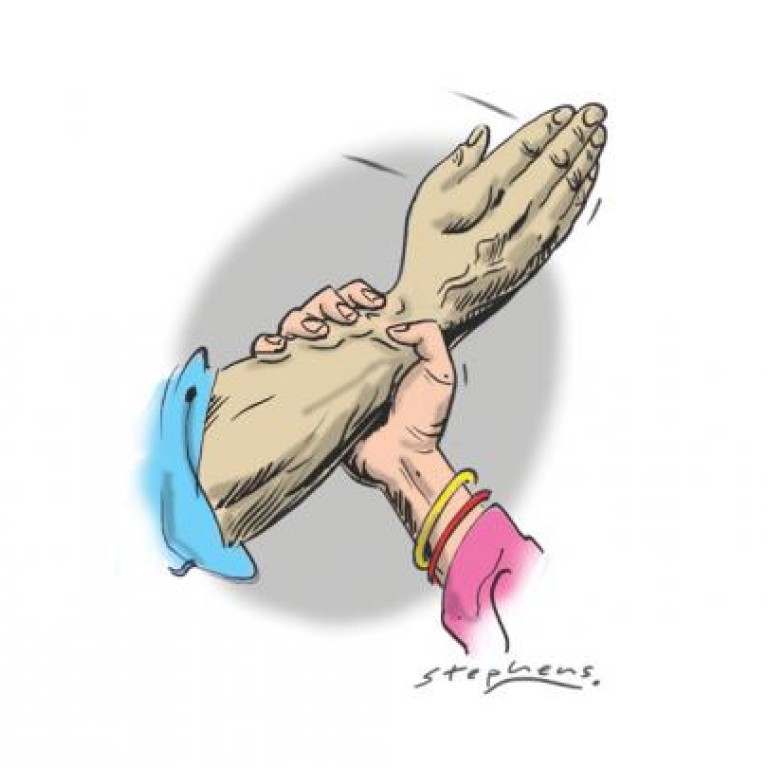
Wife-beating has no place in modern China
Lijia Zhang says changing the conservative mindset that normalises domestic violence in China will not be easy, but the support for two women in recent cases has been heartening
Chen Guihua, a 48-year-old grandmother, ekes out a living from a massage parlour in Tianjin, offering massage in the front room and sex in the back room. Her life as a "working girl" isn't a bed of roses but it is much better than her previous life - a battered wife living with an explosive husband, an experience she describes as "the 18th layer of hell".
I met Chen, originally from Liaoning, last year, while researching a book on prostitution. I was reminded of her story by two recent high-profile cases of domestic violence. In one case, Kim Lee, the American wife of the celebrity founder of Crazy English, a popular language-learning programme, won her divorce settlement; in the other, Li Yan, a woman from Sichuan , is facing execution for killing her abusive husband.
Chen could easily have been another Li Yan. She confessed to me that she thought about killing her husband but could not bring herself to do it.
Through matchmaking, Chen met and married a man who lived far away. She soon discovered he was hot-tempered. After the birth of their second daughter, the violence escalated as he blamed her for not producing a son. He would beat her with sticks or farming tools over trivial matters. When she dared to fight back, he dislocated her shoulder. She took refuge at her parents' home and started to talk about divorce. But, each time, her father would send her back with a warning not to disgrace the family.
Fearing for her life, Chen finally ran away after a severe beating and joined a friend who worked at the massage parlour in Tianjin.
Thus, another woman's life was ruined by domestic violence, now an epidemic in China. Research conducted by the All-China Women's Federation released last month indicated that one in four women have suffered domestic violence, while the Anti-Domestic Violence Network, a Beijing-based NGO, put it at one in three. "Domestic violence is caused by the disparity of power, an unequal relationship between men and women," said Feng Yuan, co-founder of the network.
I blame Confucius for the feudal male chauvinism plaguing society. According to Confucianism, a virtuous woman should be subordinate to her father before marriage, to her husband after marriage and to her son after the death of her husband. Chinese communists have undoubtedly improved the lot of women but they haven't wiped out Confucius' influence.
Domestic violence is more widespread in the countryside where society tends to be more conservative. Wife-bashing isn't regarded as wrong and is sometimes encouraged. There's a popular village saying: " ", which, roughly translated, means if you don't beat your wife for three days, she may forget who she is and go up on the roof and pull off the tiles.
Such a cultural attitude makes combating domestic violence particularly hard in China. Another common problem is that domestic violence is often treated as a family dispute. Chen's neighbours were reluctant to step in when arguments broke out, holding the belief that "even the wisest judge can't sort out family disputes clearly". Both she and Li Yan, currently on death row, sought help from branches of the All-China Women's Federation but their complaints were brushed aside as "family matters". For the same reason, the police are often reluctant to get involved and court sentences tend to be lenient towards the abusers.
Chen paid a high price for her action: she had to leave behind her daughters and feels shame about the job she does. Yet, she is glad she can now breathe freely. Millions of women simply have to endure their husbands' iron fists because there's no way out. Divorce is frowned upon. Even if women do seek a divorce, Chinese courts don't usually treat them as favourably as a Western court would, even if the man is well-off.
Because of their unequal status, rural women find it hard to make a living independently. Their parents may not be able to take them back, as in Chen's case. And since her - family registry - is with her in-laws, she would not be allocated a plot of land to work on in her home village.
The lack of a specific law to deal with domestic violence is another problem. And there is little help available to the victims. In theory, there are hundreds of government-run shelters. In reality, they are of little use as they require strict criteria, such as identification and an employer's certification.
However, I do see bright spots, in particular the increase in activism that is highlighting the issue. Recently, I braved the snow to join a dozen or so activists and supporters outside Chaoyang District Court for the final hearing of the Kim Lee case. Among the crowd was the familiar figure of Feng Yuan who has been working tirelessly to save Li Yan, writing petitions to the Supreme People's Court and the All-China Women's Federation.
Feng co-founded the non-governmental organisation with the idea to change the public's view of domestic violence and advocate for stronger laws. Will the government listen to these ever louder voices?

